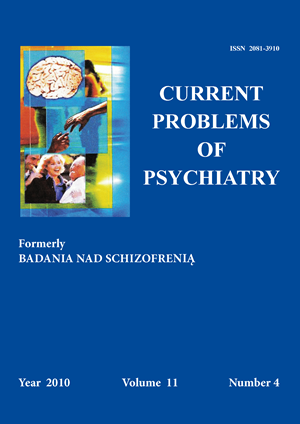Time perception in schizophrenia. Research report
Keywords:
paranoid schizophrenia, time perceptionAbstract
In this project, we have decided to examine which category of time would be the dominating one through the analysis of verbs used in the statements of persons diagnosed with paranoid schizophrenia and in the statements of healthy individuals. According to the results of research conducted by Melges, which have demonstrated that a long-term hospital stay is conducive to the concentration on the past, we have assumed that the predominant tense among those diagnosed with schizophrenia would be the category of past tense, while in healthy individuals - the present tense. This is caused by the great monotony of hospital life which has been mentioned by Kępiński, as well as others. And it often occurs in patients as a need to search in their past experiences for the reasons of their own illness. We have assumed that this tendency should be particularly strong in people with negative symptoms (deficits) of the illness, characteristic for the chronic type of schizophrenia. In the evaluation carried out in five large psychiatric centers, there were 132 hospitalized patients with diagnosed paranoid schizophrenia who were shown sequentially five photographs and asked to describe what they saw in them. Upon the agreement of all who were evaluated, their statements were recorded with a dictaphone and then transcribed in the format of the Transcriber program. Using the PANSS scale, all patients were divided into two groups: the positive (80 persons) and negative(52 persons)syndromes for schizophrenia. In order to determine the level of significance of detected differences, we have analyzed the variance by applying the HSD Tukey test. It confirmed the relevance of the difference in the usage of verbs in the past tense forms between the schizophrenic patients and the healthy individuals. While describing the presented photographs, patients with schizophrenia – especially those with the positive syndrome and not the negative one – which was the hypothesis from the start, turned increasingly retrospective, going back in time to their own memories and experiences. Unlike the healthy persons who concentrated on the actual examination situation, the situation of the here and now, without the need for analyzing the past.
References
1. Zimbardo P., Boyd J. Paradoks czasu. PWN; Warszawa: 2009.
2. Kępiński A. Schizofrenia. Wydawnictwo Literackie; Kraków: 2001.
3. Termińska K. Fenomenologia zaburzeń porządku czasu w schizofrenii. Bad. Nad Schizofr., 1995.
4. Stevens, M., Crow, T.J., Bowman, M.J., Coles, E.C. Age disorientation in schizophrenia: A constant prevalence of 25 per cent in a chronic mental hospital population. Br. J. Psychiatry, 1978; 32: 130-136.
5. Melges F.T. Time and the Inner Future: A Temporal Approach to Psychiatric Disorders. John Wiley & Sons; New York: 1982.
6. Szefel A., Wendorff K. Poczucie wieku i zaburzenia orientacji w czasie u długotrwale hospitalizowanych chorych na schizofrenię. Psychiatr. Pol., 1983; 17(5-6): 411-416.
7. Densen E. Time perception and schizophrenia. Percept. Mot. Skills, 1977; 44(2): 436-438.
8. Wahl O.F., Sieg D. Time estimation among schizophrenics. Percept. Mot. Skills, 1980; 50(2): 535-541.
9. Andreasen N., Crow T. Thought, language and communication disorders. Clinical assessment, definition of terms and evaluation of their reliability. Arch. Gen. Psychiatry, 1979; 36: 1315-1321.
10. Wciórka J. Schizofrenia. W: Bilikiewicz A., Pużyński S., Rybakowski J., Wciórka J. red., Psychiatria, t. 2. Wydawnictwo Medyczne Urban & Partner; Wrocław: 2002. s. 213-277
11. Andreasen N. Scale for the Assessment of Negative Syndroms (SAPS). University of Iowa; Iowa City: 1984.
12. Andreasen N. Scale for the Assessment of Positive Syndroms (SAPS). Iowa City: University of Iowa; 1984.
13. Obrębski T., Stolarski M. UAM Text Tools - A Flexible NLP Architecture. W: Calzolari N. red., Fifth International Conference on Language Resources and Evaluation. ELRA; Paris: 2006, s. 2259-2262.
14. Pennebaker J.W., Stone L.D. Words of Wisdom: Language Use Over the Life Span. J. Pers. Soc. Psychol., 2003; 85(2): 291-301.
15. Czerwińska M. Wpływ złożoności środowiska i reaktywności jednostki na genezę urojeń schizofrenicznych i zróżnicowanie ich treści. Psychiatr. Pol., 1994; 28(2): 191-205.
16. Nolen-Hoeksem S. Responses to Depression and Their Effects on the Duration of Depressive Episodes. J. Abnorm. Psychol., 1991; 100: 569-582.
17. Birchwood M., Jackson Ch. Schizofrenia. Gdańskie Wydawnictwo Psychologiczne; Gdańsk: 2004.


